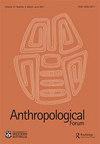Disruption in Bio-Psycho-Social Context: Children’s Perceptions of the COVID-19 Pandemic in Aotearoa New Zealand
IF 0.7
3区 社会学
Q3 ANTHROPOLOGY
引用次数: 1
Abstract
ABSTRACT Children growing up during the COVID-19 pandemic have seen unprecedented restructuring of their childhoods through lockdowns, virtual schooling and other public health measures. Theories of biographical disruption developed from individual experiences of life-altering diagnoses predict that unforeseen events such as the pandemic will restructure individual perceptions of their future life narrative. Such theories have been developed from adult experiences, however, with scholars suggesting that normalcy may be more salient to children’s experience of chronic illness. Children’s experiences might be expected to vary from those of adults’ due to their different structural position and younger life history which shifts children’s perceptions of temporality, normalcy and disruption. Empirical evidence from young people with chronic illness, meanwhile, describes diverse experiences of continuity and disruption, while the rhythms and interruptions of childhood chronic illness remain without an adequate explanatory framework. Aotearoa New Zealand’s zero-COVID approach presents a unique opportunity to understand children’s perceptions of disruption and continuity. I worked with 26 children aged 7–11 living in diverse locations in Auckland, developing a comic-based method to elicit children’s perspectives and co-construct narratives over virtual or in-person research visits. Juxtaposed with caregiver experiences and paediatric asthma research, I analyse children’s perspectives to suggest how children differently make sense of and accommodate crisis events. I argue that moving beyond biographical disruption to address the bio-psycho-social factors producing diverse ruptures, discontinuities and interferences will more completely represent children’s experiences of chronic illness and life crises.生物-心理-社会背景的破坏:新西兰奥特罗阿儿童对COVID-19大流行的看法
在2019冠状病毒病大流行期间长大的儿童,通过封锁、虚拟学校和其他公共卫生措施,经历了前所未有的童年重组。从改变生活的诊断的个人经历中发展出来的传记破坏理论预测,诸如大流行之类的不可预见的事件将重构个人对未来生活叙事的看法。然而,这些理论是从成人的经历中发展而来的,学者们认为,在儿童的慢性疾病经历中,正常可能更为突出。儿童的经历可能会与成人不同,因为他们的结构位置不同,年轻的生活史改变了儿童对暂时、正常和破坏的看法。与此同时,来自患有慢性疾病的年轻人的经验证据描述了连续性和中断的各种经历,而儿童慢性疾病的节奏和中断仍然没有适当的解释框架。新西兰的零covid方法为了解儿童对中断和连续性的看法提供了一个独特的机会。我与生活在奥克兰不同地区的26名7-11岁的儿童一起工作,开发了一种基于漫画的方法,通过虚拟或面对面的研究访问来引出儿童的观点和共同构建叙事。并置照顾者的经历和儿科哮喘研究,我分析儿童的观点,以建议儿童如何不同地理解和适应危机事件。我认为,超越传记性的破坏,解决产生各种破裂、不连续性和干扰的生物-心理-社会因素,将更完整地代表儿童的慢性疾病和生活危机经历。
本文章由计算机程序翻译,如有差异,请以英文原文为准。
求助全文
约1分钟内获得全文
求助全文
来源期刊

Anthropological Forum
ANTHROPOLOGY-
CiteScore
3.60
自引率
10.00%
发文量
14
期刊介绍:
Anthropological Forum is a journal of social anthropology and comparative sociology that was founded in 1963 and has a distinguished publication history. The journal provides a forum for both established and innovative approaches to anthropological research. A special section devoted to contributions on applied anthropology appears periodically. The editors are especially keen to publish new approaches based on ethnographic and theoretical work in the journal"s established areas of strength: Australian culture and society, Aboriginal Australia, Southeast Asia and the Pacific.
 求助内容:
求助内容: 应助结果提醒方式:
应助结果提醒方式:


